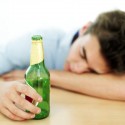On Russians' drinking habits
A SuperJob.ru survey says most Russians believe alcohol abuse is their most negative character trait(!). 22% of 1800 respondents believe it is so, while 20% claim Russians’ curse is their laziness.
Boozing has become something of a national character trait in Russia. Although statistics shows that alcohol consumption has been annually reducing in Russia, stories by foreigners traveling to this country describe mass alcoholism.
XVI – XIX century books by European writers describe Russians as the “most drinking nation”. XVII century Swedish envoy to Russia, Petr Petrej de Erlezunda wrote: “…there is no place among Russians to those who are not used to drinking much”. Astolphe de Custine wrote in 1839 that Russians’ favorite entertainment is drinking, and he felt deeply sorry for them because as he said, to feel truly happy they need to have a dream. Russian author Dostoevsky claimed the kindest people in Russia were those drunk, and the drunk were the kindest.
In XIX century Russian peasants’ welfare was judged by their ability to drink and by whether or not they had alcoholic drinks at their house. The ability to drink much spoke of the person’s physical endurance. People would often invite neighbors for a drink to their place to show their hospitality. Drinking was seen as something bad only by family members, if the man would drink instead of working and if he would spend his money for that matter. However, it was OK if he drank after work for his friends’ money.
Russians have preserved many of their “drinking traditions”. For instance, being a guest at somebody’s place you would often be expected to drink a whole glass of vodka not leaving any of it on the bottom, because that is the “evil” you’re leaving in the glass. Russians often drink for each others health, za zdorovye, as they say. Very often Russians have small “celebrations” on any occasions, like when they get the salary, or when they buy something nice.
Do Russians drink more than before? The average Russian consumes almost three times as much alcohol as he did 16 years ago. A report by Gennadi Onishenko, head of the consumer protection agency, found that Russians drink 15 liters of pure alcohol per year, or half a pint a week, compared with 5.4 litres in 1990. A study in 2005 calculated that at least 2.3 million people in Russia were alcoholics.
Numerous reports tell about poisoning by counterfeit alcohol. Bottles of alcohol on sale in Russian shops often contain poisonous liquids. Although politicians consider alcohol abuse to be a “national tragedy”, more and more people continue to die of alcoholism every day. More than 100 people die every day, having poisoned themselves on counterfeit alcoholic drinks. “Beer alcoholism” has become very popular. One of the most striking changes in Russian cities in recent years is certainly the habit teenagers of both sexes have developed of roaming the streets with a bottle of beer as a fashion accessory.
Russia’s love of alcohol continues to fuel some of the world’s highest rates of fatal accidents, premature death, violent crime and domestic violence.
______________
source: http://www.russia-ic.com
